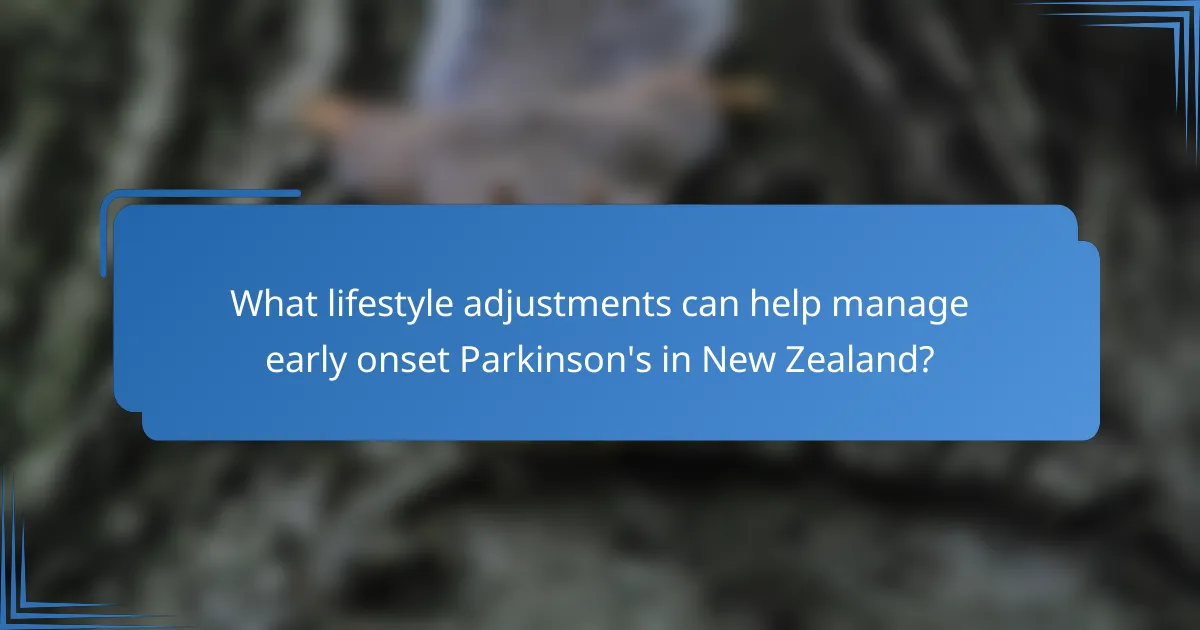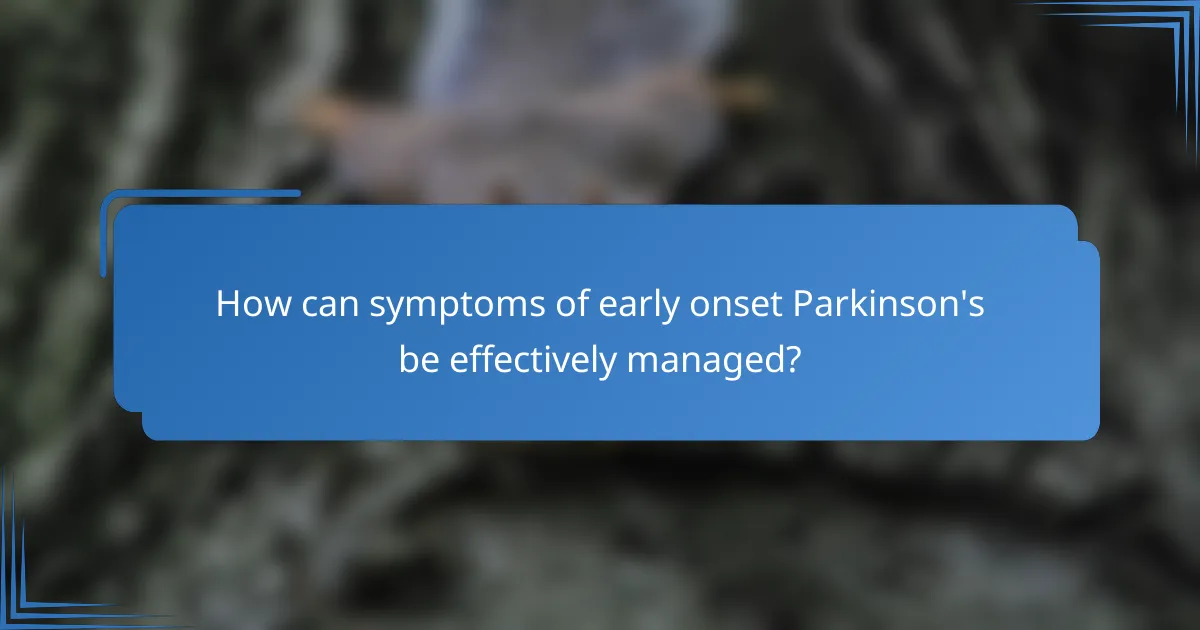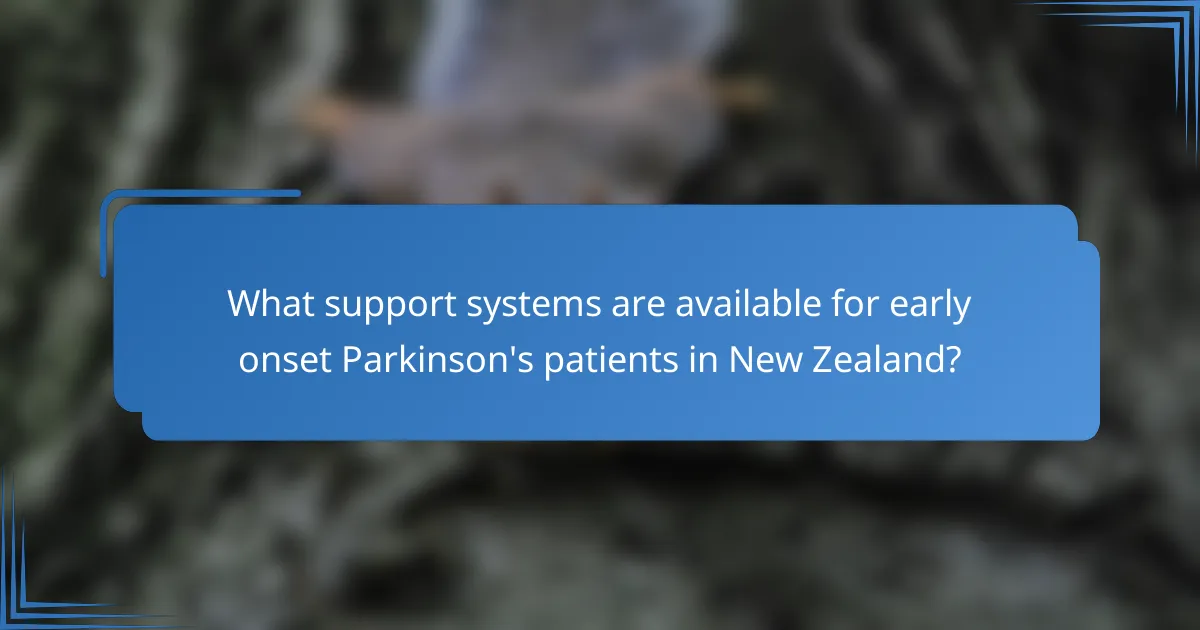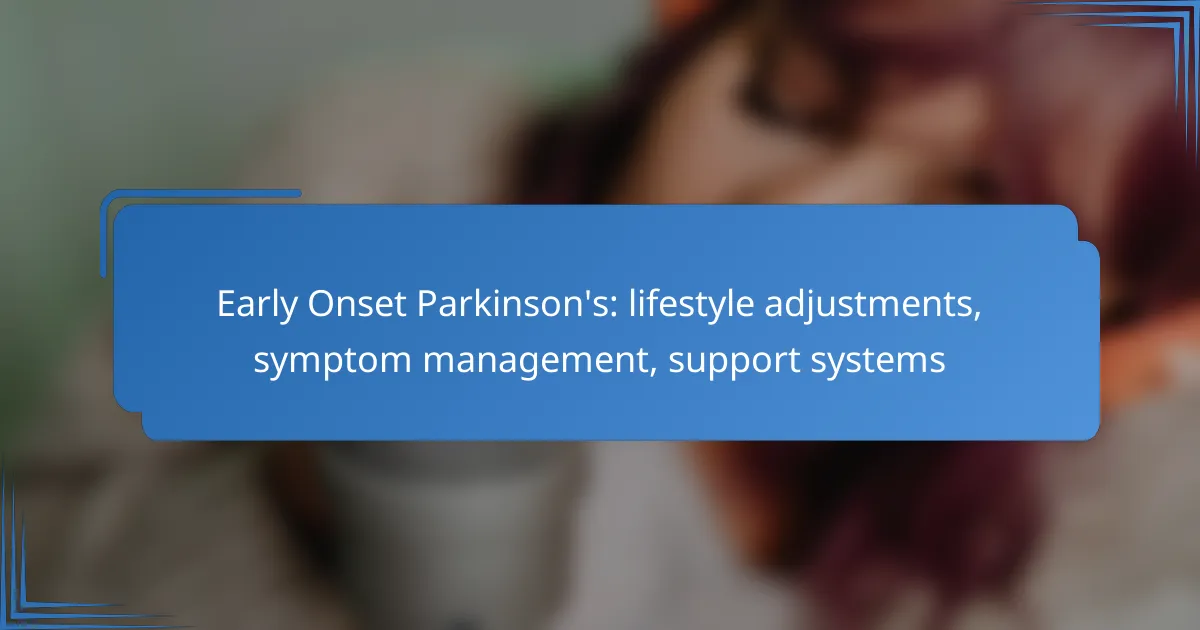Early onset Parkinson’s requires proactive lifestyle adjustments to enhance quality of life, including regular exercise, dietary changes, and effective stress management. A comprehensive approach to symptom management combines medications, therapies, and tailored support systems to help individuals maintain independence and well-being. In New Zealand, patients can benefit from local support groups and online communities that foster connection and provide valuable resources for navigating their journey.

What lifestyle adjustments can help manage early onset Parkinson’s in New Zealand?
Managing early onset Parkinson’s in New Zealand involves several lifestyle adjustments that can significantly improve quality of life. Key areas include regular physical exercise, healthy diet modifications, stress management techniques, and sleep hygiene practices.
Regular physical exercise
Engaging in regular physical exercise is crucial for individuals with early onset Parkinson’s. Activities such as walking, swimming, or cycling can enhance mobility, strength, and balance. Aim for at least 150 minutes of moderate aerobic activity each week, spread across several days.
Incorporating strength training exercises two to three times a week can further support muscle health. Consider joining local exercise classes specifically designed for people with Parkinson’s, which can provide both physical benefits and social interaction.
Healthy diet modifications
Adopting a healthy diet can help manage symptoms of early onset Parkinson’s. Focus on a balanced intake of fruits, vegetables, whole grains, and lean proteins. Foods rich in antioxidants, such as berries and leafy greens, may help combat oxidative stress associated with the condition.
Limit processed foods and those high in saturated fats, as they can exacerbate inflammation. Staying hydrated is also essential; aim for at least 1.5 to 2 liters of water daily, adjusting based on activity levels and climate.
Stress management techniques
Effective stress management is vital for individuals with early onset Parkinson’s, as stress can worsen symptoms. Techniques such as mindfulness meditation, yoga, and deep-breathing exercises can promote relaxation and improve emotional well-being. Consider dedicating a few minutes each day to practice these techniques.
Engaging in hobbies or activities that bring joy can also alleviate stress. Connecting with support groups, either in-person or online, can provide a sense of community and shared experience, further reducing stress levels.
Sleep hygiene practices
Good sleep hygiene is essential for managing early onset Parkinson’s. Establish a regular sleep schedule by going to bed and waking up at the same time each day. Create a calming bedtime routine that may include reading or gentle stretching to signal your body that it’s time to wind down.
Ensure your sleeping environment is conducive to rest by keeping the room dark, quiet, and cool. Avoid screens and stimulants like caffeine in the hours leading up to bedtime to improve sleep quality.

How can symptoms of early onset Parkinson’s be effectively managed?
Effective management of early onset Parkinson’s symptoms involves a combination of medications, therapies, and support systems tailored to individual needs. These approaches aim to alleviate symptoms, enhance quality of life, and maintain independence.
Medication options
Medications are often the first line of defense in managing early onset Parkinson’s symptoms. Common options include levodopa, dopamine agonists, and MAO-B inhibitors, which help to increase dopamine levels in the brain. It’s essential to work closely with a healthcare provider to determine the most effective regimen, as responses can vary significantly among individuals.
Monitoring for side effects is crucial, as some medications may lead to complications such as dyskinesia or fluctuations in symptom control. Regular follow-ups can help adjust dosages and switch medications if necessary to optimize treatment outcomes.
Physical therapy benefits
Physical therapy plays a vital role in managing mobility and balance issues associated with early onset Parkinson’s. A physical therapist can design a personalized exercise program that focuses on strength, flexibility, and coordination, which can help reduce the risk of falls.
Engaging in regular physical activity, such as walking, swimming, or tai chi, can improve overall physical function and may even have neuroprotective effects. Aim for at least 150 minutes of moderate exercise per week, but consult a therapist for tailored recommendations.
Occupational therapy strategies
Occupational therapy focuses on enhancing daily living skills and maintaining independence. An occupational therapist can assess the individual’s home and work environment, recommending modifications to improve safety and accessibility.
Strategies may include using adaptive tools for cooking or dressing, organizing tasks into manageable steps, and implementing routines that reduce fatigue. These adjustments can significantly improve quality of life and help individuals maintain their roles in family and community settings.
Speech therapy solutions
Speech therapy addresses communication and swallowing difficulties that may arise with early onset Parkinson’s. A speech-language pathologist can provide exercises to improve voice volume, clarity, and articulation, which can enhance social interactions.
For those experiencing swallowing issues, strategies such as modifying food textures and practicing safe swallowing techniques can prevent complications. Regular sessions can help maintain effective communication and ensure safety during meals.

What support systems are available for early onset Parkinson’s patients in New Zealand?
In New Zealand, early onset Parkinson’s patients can access various support systems that include local support groups, online communities, and professional counseling services. These resources are designed to help individuals manage their symptoms and connect with others facing similar challenges.
Local support groups
Local support groups provide a vital space for early onset Parkinson’s patients to share experiences and receive emotional support. These groups often meet regularly in community centers or health facilities, allowing members to discuss their challenges and coping strategies.
In New Zealand, organizations like Parkinson’s New Zealand offer regional support groups that cater to specific areas, ensuring that patients can find a community close to home. Participating in these groups can foster a sense of belonging and reduce feelings of isolation.
Online communities and resources
Online communities serve as an excellent resource for early onset Parkinson’s patients, offering forums and social media groups where individuals can connect regardless of their location. Websites like the Parkinson’s New Zealand website provide valuable information and links to online support networks.
These platforms allow patients to share advice, ask questions, and find emotional support at any time. Engaging in online discussions can be particularly beneficial for those who may have difficulty attending in-person meetings.
Professional counseling services
Professional counseling services are crucial for early onset Parkinson’s patients who may experience anxiety, depression, or other emotional challenges. Psychologists and counselors trained in chronic illness can provide tailored support to help individuals cope with their diagnosis.
In New Zealand, patients can access mental health services through public health systems or private practitioners. It’s advisable to seek out professionals who have experience with Parkinson’s, as they can offer specialized strategies for managing symptoms and improving overall well-being.

What are the key criteria for selecting Parkinson’s management tools?
When selecting management tools for Parkinson’s, consider their effectiveness, user-friendliness, and cost. These criteria help ensure that the tools not only meet your needs but are also practical and sustainable for long-term use.
Effectiveness of the tool
The effectiveness of a Parkinson’s management tool is crucial for symptom control and improving quality of life. Look for tools that have been clinically validated or recommended by healthcare professionals. For instance, exercise programs specifically designed for Parkinson’s patients can significantly enhance mobility and reduce stiffness.
Additionally, consider tools that offer personalized tracking of symptoms and progress. Apps that allow users to log medication intake and monitor changes can provide valuable insights for both patients and caregivers.
User-friendliness
User-friendliness is essential for ensuring consistent use of management tools. Tools should be intuitive and easy to navigate, especially for individuals who may have cognitive or motor challenges. For example, a medication reminder app should have clear notifications and a simple interface.
Testing a tool before fully committing can help determine its ease of use. Many apps offer free trials, allowing users to assess whether they can comfortably integrate the tool into their daily routine.
Cost considerations
Cost is a significant factor when selecting Parkinson’s management tools, as expenses can vary widely. Some tools may be covered by health insurance, while others may require out-of-pocket payments. It’s important to evaluate both one-time costs and ongoing expenses, such as subscription fees for apps or services.
Consider looking for tools that offer a good balance between cost and functionality. Free or low-cost options can be effective, but ensure they meet the necessary criteria for effectiveness and user-friendliness before making a decision.

How do lifestyle changes impact the progression of early onset Parkinson’s?
Lifestyle changes can significantly influence the progression of early onset Parkinson’s by improving overall health and potentially slowing symptom development. Adopting healthier habits such as regular exercise, a balanced diet, and social engagement can enhance quality of life and mitigate some challenges associated with the condition.
Research findings on lifestyle effects
Studies indicate that individuals with early onset Parkinson’s who engage in regular physical activity may experience slower disease progression and improved motor function. Research has shown that lifestyle factors, including diet and social interactions, can also play a role in managing symptoms and enhancing well-being.
For instance, a Mediterranean diet rich in fruits, vegetables, whole grains, and healthy fats has been linked to better outcomes in Parkinson’s patients. Additionally, maintaining strong social connections can provide emotional support, which is crucial for coping with the challenges of the disease.
Long-term benefits of exercise
Regular exercise offers numerous long-term benefits for those with early onset Parkinson’s, including improved mobility, balance, and coordination. Activities such as walking, swimming, or cycling can help maintain physical function and reduce the risk of falls.
Engaging in strength training and flexibility exercises can also enhance muscle strength and joint health. Aim for at least 150 minutes of moderate-intensity aerobic activity each week, along with two or more days of muscle-strengthening activities.
It’s essential to choose enjoyable activities to promote consistency. Consider joining a local exercise group or class tailored for individuals with Parkinson’s to foster motivation and social engagement while exercising.

What emerging trends are shaping the future of Parkinson’s management?
Emerging trends in Parkinson’s management focus on enhancing patient care through technology and innovative practices. These trends aim to improve symptom management, increase accessibility to healthcare, and provide better support systems for individuals living with the condition.
Advancements in telehealth services
Telehealth services are transforming how patients with Parkinson’s connect with healthcare providers. These services allow for remote consultations, which can be particularly beneficial for those with mobility challenges or those living in rural areas. Patients can schedule video appointments, receive follow-up care, and even participate in group therapy sessions from the comfort of their homes.
To maximize the benefits of telehealth, patients should ensure they have a reliable internet connection and familiarize themselves with the necessary technology. It’s also important to prepare for appointments by keeping a list of symptoms and questions to discuss with their healthcare provider.
Innovations in wearable technology
Wearable technology is becoming increasingly important in managing Parkinson’s symptoms. Devices such as smartwatches and fitness trackers can monitor movement patterns, sleep quality, and medication adherence. This data can help healthcare providers tailor treatment plans more effectively.
Patients should consider using wearables that offer features specifically designed for Parkinson’s management, such as tremor detection or fall alerts. Regularly reviewing the data collected by these devices can provide valuable insights into symptom fluctuations, helping patients and their doctors make informed decisions about adjustments in therapy or lifestyle changes.
